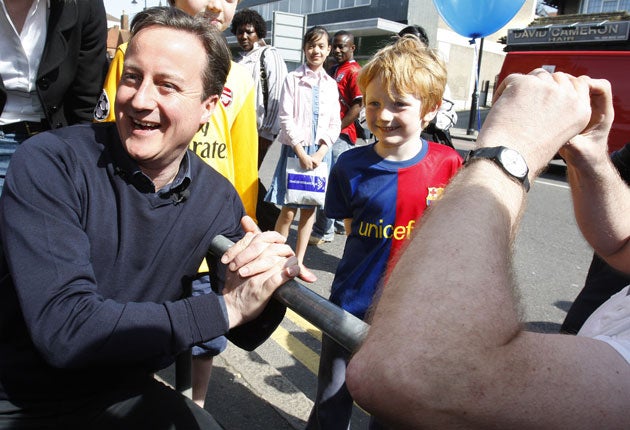Cameron's £3 wedding gift – to pensioners
The Conservatives want to endorse marriage, but their tax break for married couples is an expensive idea that would benefit few

It is a marriage tax break that would benefit only a third of those who walked down an aisle – and stayed with their partners. It hopes to encourage marriage, but two in five of all those who would benefit are pensioners. And it would seek to "reward" married couples by giving them a weekly sum that would barely cover the price of a milky coffee. Add to that the fact that, at a time when the national deficit is £167bn, David Cameron would take £550m from a levy on banks and use it to fund this handout, and it is difficult to work out why the Conservatives have risked their economic credibility on such a controversial idea.
Worse, this is not an ill-judged, impulsive response to the pressure of the campaign. The demand to "back marriage in the tax system" has been a reassuringly traditionalist refrain since Mr Cameron took over with a pledge to modernise the Conservative Party four years ago. But it has never been only question of money. The marriage tax break was originally raised in former leader Iain Duncan Smith's plans to tackle the social problems of "broken Britain".
In the debate on the Queen's Speech in November 2007, Mr Cameron said: "In this age of unease, we need to strengthen families and make our society more responsible. That means ending the couple penalty in the benefits system; backing marriage in the tax system."
Yet his fiscal solution to this broken part of Britain is remarkably puny – a move Liberal Democrat leader Nick Clegg dismissed as "patronising drivel". While critics have focused on the number of people who would be excluded, even those expected to qualify could hardly dine out on the Tories' largesse. The much trailed tax break would be worth at best £150 a year – £3 a week.
Shadow Universities and Skills spokesman David Willetts yesterday played down suggestions that the Tories wanted to offer a financial incentive for couples to get married, preferring instead to declare that the party wanted to "recognise" marriage.
"This isn't an intrusive attempt to make moral judgments," Mr Willetts told the BBC. "We are trying to send out a signal about the importance of marriage as an important commitment and we're also trying to ease the tax burden on people."
However, the independent Institute for Fiscal Studies (IFS) – whose figures the Tories used to justify their plan – questioned whether the change would be enough even to encourage couples to recognise the financial value of their own marriages.
"The incentives to marry – or not to divorce – provided by a policy whose maximum benefit is £150 a year must surely be weak relative to the other costs and benefits involved," the IFS said. "If encouraging marriage is seen as desirable primarily for the impact that it has on child development, it is not clear that a policy where pensioner families make up more than a third of the beneficiaries is well targeted."
Along with those married pensioners, over a million people in Britain who have separated but are still legally married – and those who abandon their partners but remain married to them – would benefit from Mr Cameron's contribution to making British society more responsible.
Single-parent families would get nothing. Neither would cohabiting couples, two married teachers with children – or people whose partners have abandoned them and their children. Widows whose husbands have died serving the country in military campaigns would be excluded.
Kate Bell of the national single parents' charity Gingerbread said many of those living in poverty – 40 per cent of whom are single parents – would miss out. She said: "We really want all money that there is to be supporting all families, not just one particular family type."
The Secretary of State for Work and Pensions, Yvette Cooper, said it was "appalling to tell widows or women who've left an abusive husband that they don't deserve support".
Join our commenting forum
Join thought-provoking conversations, follow other Independent readers and see their replies
Comments
Bookmark popover
Removed from bookmarks